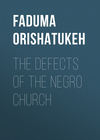Loe raamatut: «The Defects of the Negro Church», lehekülg 2
I have attempted to indicate briefly in what lines the church is exposed and is tending to outwardness. It lays greater stress on evolution of life; in eagerness for the expression of its life it neglects its impression; it emphasizes extensiveness rather than intensiveness, quantity rather than quality; it runs after the gewgaws of religion and does not look inward, deep down in the soul; its organization lacks an organ with a spiritual life deep enough to suppress worldliness.
II. NEGLECT OF RURAL COMMUNITIES
Another defect of the Negro church is her neglect of rural communities. From eighty to eighty-five per cent of the race is to be found in our small towns where ignorance and superstition prevail to an alarming extent. Among the causes of this neglect are:
(1) The need of adequate funds for the support of churches.
(2) The need of suitable men for these churches.
(3) Discrimination made by church authorities in the sending of their best men to fill city churches on account of inadequate funds in the country churches.
(4) The poverty of country churches and their inability to provide for the support of their pastors, especially those who are needed most in cities.
(5) The repulsiveness of rural districts on account of inadequate protection and little justice given to the Negro.
Where there are supplementary grants or a reserve fund as aids to struggling churches, better work is done and suitable men are seen in the country churches. Suitable men are so rare that the city churches easily keep them by the offer of larger salaries. Even the city’s need is not yet fully met. The demand is greater than the supply in both places but still greater in the country. For this neglect of country churches, a neglect by no means wilful, what are the results? We may mention a few.
(1) Country pastors are often compelled to take to other callings, their church work being supplementary and subsidiary. Hence energy needed for pastoral and pulpit work is dissipated in the effort to make a living.
(2) The paganization of Christianity. One of the saddest things that has happened to Negroes in our rural districts is the presentation to them of Christianity in a crude, uncouth, and distorted form. It is a form of Christianity with the Christ left out. The songs of the church, its prayers and experiences are there but in a mutilated form, divested of their spiritual significance. The “Big Meeting,” or revival meeting often gives an opportunity for a revival of the latent paganism in the Negro. The weird songs, the wild excitement of the people followed by the unchaste exposures and hysteria of women, the physical agony and wallowing on the floor, and the violent physical gymnastics among both sexes is a species of voodooism imported from the religion of heathen Africa. It is deplorable because its after effects are demoralizing. The situation is grave and calls for rebuke, because it is deeply entrenched in our country churches and is encouraged by pastors who ought to point out a better way. In Africa Christianity is displacing paganism, in rural America paganism is displacing Christianity. Our rural population is confronted with a form of Christianity which does not civilize. Since the corruption of the best thing is the worst thing, it may be fairly stated that Christianity is receiving an unfair treatment in a professedly Christian country from a professedly Christian people.
(3) Funds being inadequate to support country churches, and men qualified to fill them being few even if funds were at hand, there follows as a necessity the employment of unqualified men to fill vacancies. So pressing is the need for preachers that in many cases any kind of men rather than no men at all seems to be the best that can be done. Hence some men accept appointments for what they can get out of them. Fitness in any form is out of the question in many of these appointments. The country churches have therefore become the dumping ground where pastors sink or swim. There too may be found a host of immoral preachers. This fact in itself creates a prejudice in the minds of a class of preachers against accepting country appointments. It is only the few who are strongly imbued with a missionary spirit that are willing to labor and lift up the standard in the interest of God and fallen humanity. One of the surest ways of breaking down this prejudice is for the churches to send some of their best men to country churches and provide for their support. Missionary societies aiming at best results send some of their best men as pioneers and bishops to the heathen. It is only by a selective method of appointing men to our country churches that these places can be reclaimed from heathenism and immorality. It is only then that the “wilderness and the solitary place shall be glad, and the desert shall rejoice and blossom as the rose.”










